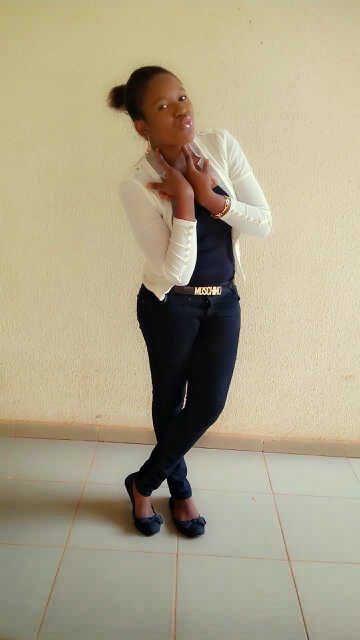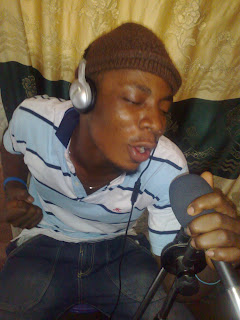Profile of the week! Onyeka Nwelue (Writer)
I always told my friends that exceptionally successful people have exceptional success stories. The profile of Onyeka Nwelue sometime 3 years ago made me have a re-think; I pray you think too. I got this from Wikipedia, an online encyclopedia. You should have known it's not easy to be there.
1988–2009: Early life and beginning
Onyeka Nwelue was born in Ezeoke Nsu, Imo State, Nigeria. Throughout his youth, he aspired to be a writer and filmmaker. After joining school, he started painting and won competitions. He led the drama and debating clubs of his primary school. He was also a part of the youth choir of St. Paul’s Cathedral Church, Ezeoke Nsu before he was sent to the seminary. Considered to be very lazy by his family, he found strength in storytelling and painting and did so well in them. The son of a politician father, Chief Sam Nwelue (also a Knight of St. Christopher), and school-teacher mother, Mrs Kate Nwelue, also an Anglican Lay Reader and cousin to notable Nigerian writers Flora Nwapa and Chukwuemeka Ike. He lived in his village and attended Umunohu Primary School until he gained admission to Mount Olives Seminary, Umuezeala Nsu. He spent six years in the seminary, and in March 2006, at the age of 18, travelled to India to pursue a career in writing, living in the house of writer Abha Iyengar, before he became famous and made friends with writers and artistes of his generation, including Jyoti Guptara, one of the Guptara Twins, who was introduced to him by young Indian scientist, innovator and inventor of Glabenator, Apurv Mishra. His first novel, The Abyssinian Boy, was written within the three months of his six-month stay in India, where he had gone to write, at the invitation of the India InterContinental Cultural Association (IICCA).
After graduating from seminary, Nwelue was to join Trinity College, Umuahia, Nwelue abandoned home and went to Lagos. From Lagos, he travelled to India under the invitation of India Inter-Continental Cultural Association (IICCA), headed by Dev Bhardwaj for the International Writers’ Festival, after which he travelled to Delhi to live with the writer, Abha Iyengar. However, life in India was very difficult for him. He began to work on a novel and needed help finding the true cultures of India.
In India Nwelue practiced Hinduism before turning to atheism. He wrote mainly on religion and sexuality, having met hijras on the streets of Pahar Ganj where major parts of The Abyssinian Boy were set.
After the three months of his six month stay in India, Nwelue finished the first draft of The Abyssinian Boy
and sent it out to agents, claiming to have received over 45 rejection
slips. Depression set in and it was time to leave India; he returned to
Nigeria and got admitted into the University of Nigeria,
Nsukka to study Sociology & Anthropology. Nwelue described those
moments, as “those moments I needed validation from everyone. University
education was trending, so if I must belong to the society, I must stay
on one of the university campuses and pretend like I was adding
something to my life.” But after two years, he withdrew officially and
decided to use the term ‘drop-out’ because he believed it is
‘fashionable.’ Within these two years, he had already got signed to DADA Books and was waiting impatiently to release The Abyssinian Boy
and when it happened, he found a reason to move out of Nsukka town,
keeping himself busy with his book tour which happened in different
states of Nigeria.
The launch of The Abyssinian Boy took place at the National
Library, Yaba, Lagos and was attended by politicians, writers, actors
and relatives. Newspapers hailed Nwelue’s first book as ‘out-of-the-box’
and Indians in Nigeria praised him for capturing the Indian ethos
properly.
Prior to The Abyssinian Boy’s release, some pundits had expressed doubts that the book would be successful. However, after its release, The Abyssinian Boy went on to become a critical and commercial success. Nwelue’s portrayal of Indians was lauded by Indians themselves. Smitha Radhakrishnan from Asia Pacific Arts'''' commented: “Very fresh and unusual and completely out-of-the-box.” Notable Indian writer and journalist, Shobhaa De called it “promising.” Indian critic, Vani Nethiar wrote: “The surface of The Abyssinian Boy
pulsates with Indian and Nigerian ethos. The reader wonders whether the
novel portrays the meaninglessness of racist criminality and parochial
sentiments that run in the baser levels of any man’s consciousness.”
Magazines and newspapers chose The Abyssinian Boy as “Book of the Week” for a very long time, making it a National Bestseller as sales went up. At the Abuja Writers’ Forum, Nwelue won the TM Aluko Prize for First Book and Ibrahim Tahir Prize for Fiction. He was immediately nominated for the Creative Artiste of the Year at the Future Awards 2010, for a first book. For the third time in 2012, he was nominated in the same category, which after he lost, went on Twitter
to say to the organizers: “Please, do not nominate me again. Shows that
I’ve not been doing enough. Next time, don’t nominate me, please.”
2011–present: Breakthrough
Following The Abyssinian Boy, Nwelue began work on his second novel, Orchard of Memories, travelling to Hong Kong, where the book is set. He has described the book as “rants from two angry men, a Hong Konger and a Mexican, who are stranded at the airport in Doha, waiting for a connecting flight to Hong Kong.” According to Nwelue, the book is told in a different way. “It is a more difficult style I chose this time around. But I enjoyed writing it,” he explained further. In June, Nwelue travelled from Lagos to Lisbon and from Lisbon to Barcelona to sign at Pontas Literary & Film Agency, which happens to be the biggest literary agency in Spain. Anna Soler-Pont of Pontas wrote: “Pontas has recently become the international literary agency for Nigerian author Onyeka Nwelue and we are convinced that he is an important new literary voice in English language.”From editing FilmAfrique, an exciting new magazine published by Africa Film Academy, Nwelue got admitted into Prague Film School in Czech Republic to study Directing. He runs his company, Blues & Hills Consultancy with an office in Lagos.
Education and teaching
In 2007, he was admitted into the University of Nigeria, Nsukka, where he studied Sociology and Anthropology briefly before dropping out to pursue a diploma in Scriptwriting at the Asian Academy of Film & TV, Noida.
After graduating, he lectured at NSS College, Ottapalam, in Kerala, southern India. Nwelue has spoken to students at City University, Hong Kong, Caritas University, Enugu, Nnamdi Azikiwe University, Awka, University of Nigeria, Enugu campus, Kaduna State University, Kaduna[2] and teaches in the "Nigerian Fiction" Class at the English Language Department, University of Lagos, as a Guest Lecturer. He has also taught Film Adaptation at the Centre for Research in Art of Film & TV, Delhi, where he was Writer-in-Residence.
Literary career
Nwelue started writing at the age of eleven, as soon as he was admitted to the seminary. He wrote "The Talkative Monkey and the Rabbit", which appears in a chapter of The Abyssinian Boy.He won the Thomson Short Story Prize in 2000. He rose to fame with his appearance at the Wole Soyinka Festival in 2004, after which he was described in The Guardian as "a teenager with a steaming pen".
After he finished at the seminary, he received an invitation from the India InterContinental Cultural Association (IICA) to attend the 2nd International Writers Festival - India, that took place in several Indian states in 2006. Thereafter, he stayed in India to write, travelling to different parts and living with one of India's most celebrated authors, Abha Iyengar. His completed manuscript was sent out to agents and publishers in 2006 and Nwelue claimed to have received over 45 rejection slips, before DADA Books publisher, Ayodele Arigbabu, called from Cape Town and offered to publish the book. Many months later, a contract was signed and The Abyssinian Boy was published.[3] Nwelue was rumoured to have been paid an advance of over N2.5 million for the book, which neither he nor his publisher have denied.
Nwelue is a founding member of DRUMLINE, a select group of creative young people at the University of Nigeria, Nsukka, who were focused on creating and organising events. They also published a newspaper, DRUMLINE, which folded after unsuccessful calls for sponsors. A few months after that, Nwelue officially withdrew from the university to become the Founder/Chief Executive Officer of BLUES & HILLS Consultancy, an arts agency that champions the promotion of arts.
Danish filmmaker and visual artist Lasse Lau sought for the film rights to The Abyssinian Boy three months after its publication, but there was no proper agreement between KRAN Film and DADA Books; Nwelue got signed to Pontas afterwards. Lau and Nwelue met during an arts exhibition entitled "Maps: The World is Flat",[4] organised by Kowry Kreations in collaboration with Centre for Contemporary Art (CCA), owned by veteran visual arts promoter, Bisi Silva.
Nwelue has been published in The Guardian, Times of India, NEXT, Punch, Daily Times, The Sun, Vanguard, ThisDay, Ecletica Magazine, Kafla InterContinental, Wild Goose Poetry Review, Maple Tree Literary Supplement, Insurance & Money Weekly and other publications.
He was the editor of FilmAfrique, a new film magazine, published by Africa Film Academy, curators of the African Movie Academy Awards.
Grants, awards and festivals attended
Nwelue received a grant from the Institute for Research on African Women, Children and Culture (IRAWCC), an organisation founded by former Nigeria's Mines and Steel Development Minister, Professor Leslye Obiora, to "empower young people". In 2010, he was nominated as Creative Artist of the Year at The Future Awards. He has been nominated thrice for the award, in the same category. He has been invited and participated at the 2nd International Writers’ Festival – India, Jaipur Literature Festival-India, Man Hong Kong International Literary Festival- Hong Kong, DSC South Asian Literary Festival – UK, SWITCH Conference - Portugal, Creative Industries Session - Serbia and Lagos Book and Art Festival – Nigeria.In 2000, he won the Thomson Short Story Prize. He won the TM ALUKO Prize for First Book and came second at the Ibrahim Tahir Prize for Fiction, all in 2009, organised by Abuja Writers' Forum (AWF). He was Visiting Fellow at Centre for Public Policy Research (CPPR) in Cochin, Kerala and was a Visiting Lecturer at Sri Venkateswara College, University of Delhi. He became the first African to join Sandbox, a global community of young innovators under 30. He has read poetry at clubs and bars in Lisbon, Paris and Lagos. His collection of poems, I Will Die When I Want is due out in 2013
Source: Wikipedia encyclopedia









Comments